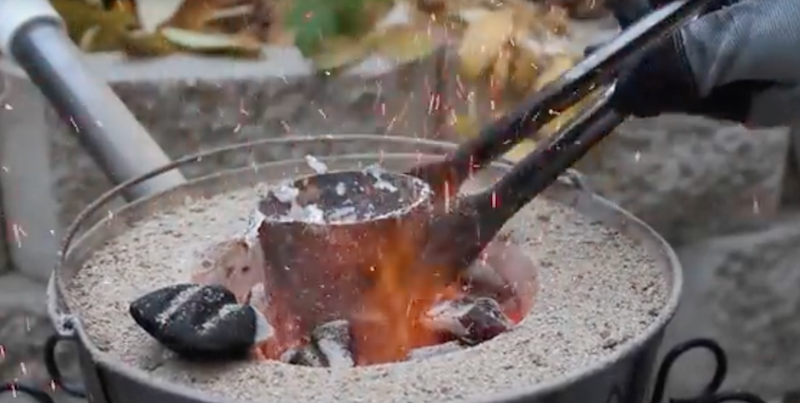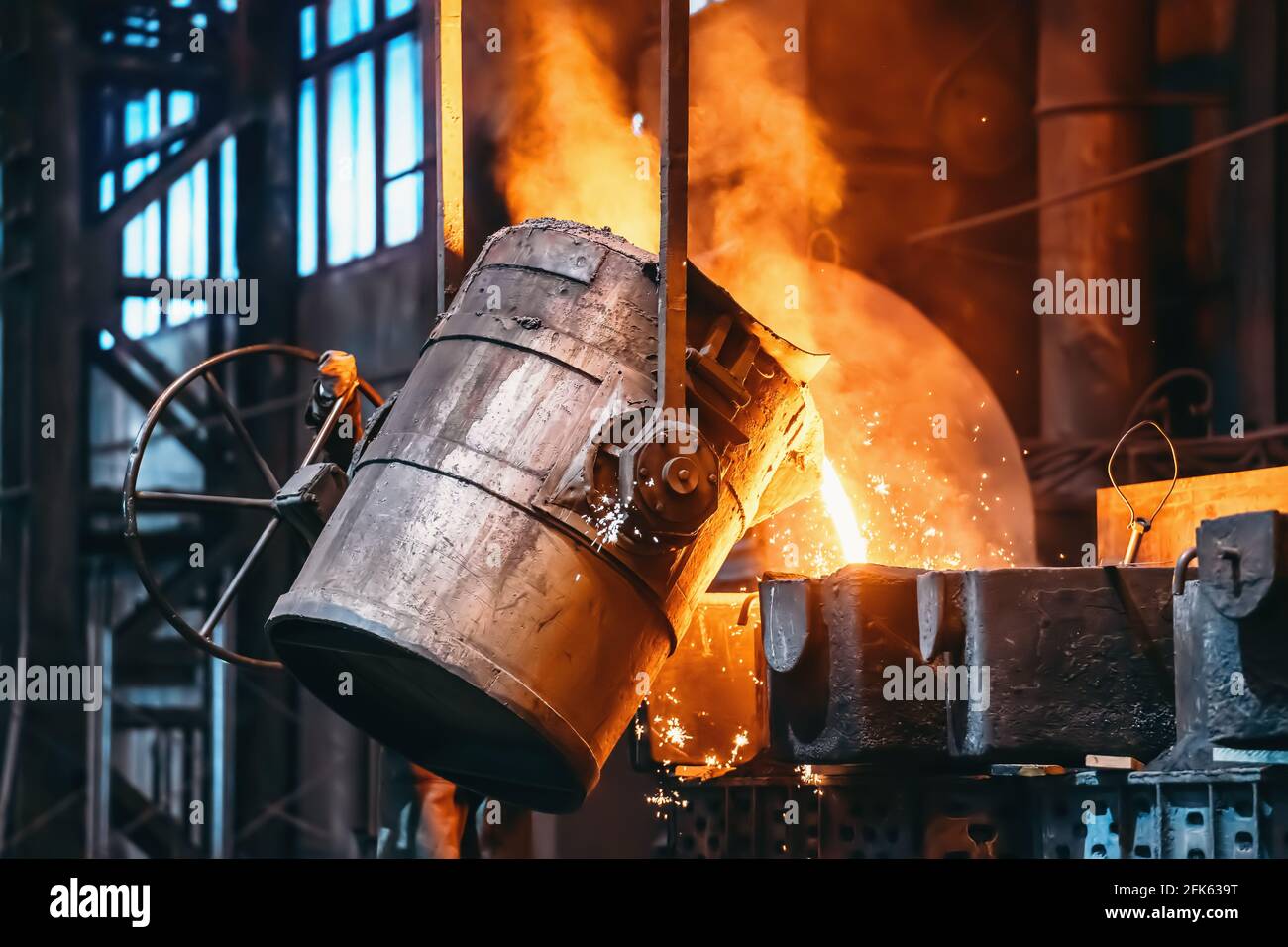Comprehensive Look into How a Metal Foundry Operates
Wiki Article
A Comprehensive Overview to Metal Casting: Advantages and Services Supplied by Foundries
Metal casting is a vital process in different industries, providing numerous benefits with the services of factories. These facilities change liquified metal right into precise and sturdy components, catering to specific client demands. By using sophisticated modern technologies, foundries guarantee top quality and effectiveness in production. The intricacies of metal casting and the diverse strategies entailed increase crucial concerns about its duty in modern-day production. What developments exist in advance in this necessary field?Recognizing the Metal Casting Process
The metal casting process is an essential method made use of in making to produce complex shapes and parts. This approach entails pouring liquified metal into a mold and mildew made to form the wanted object. The process starts with pattern production, which works as a template for the mold. Metal Foundry. Numerous products, such as sand, metal, or ceramic, are utilized for mold-making, relying on the certain demands of the casting
As soon as the mold and mildew is ready, liquified metal is poured into it and permitted to solidify and cool down. After solidification, the mold is removed, disclosing the actors part. Different strategies, including sand casting, financial investment casting, and pass away casting, are employed, each suited to different applications and materials. Quality control steps, such as evaluations and testing, are necessary to ensure the end product meets requirements. Generally, the metal casting process plays an essential duty in producing parts for sectors ranging from automotive to aerospace.
Trick Advantages of Metal Casting
Metal casting offers considerable advantages that make it a favored production technique in different markets. Its layout adaptability and accuracy enable complex forms, while cost-efficient mass production enhances efficiency. Additionally, the versatility and stamina of products utilized in casting add to the toughness of the last items.Style Flexibility and Accuracy
Launching remarkable style flexibility and precision, metal casting allows designers and designers to create complex forms and features that would certainly be difficult or difficult to attain with various other manufacturing approaches. This ability makes it possible for the manufacturing of intricate geometries, inner frameworks, and fine details that boost item functionality and aesthetics. Additionally, numerous casting techniques, such as sand casting, investment casting, and die casting, give more options for personalization, suiting varied product homes and task needs. The flexibility of mold and mildews allows alterations throughout the design stage, streamlining the shift from concept to end product. Ultimately, metal casting stands apart for its capability to provide high-precision elements, making it a vital procedure in sectors varying from vehicle to aerospace and beyond.Cost-Effective Mass Production
Affordable mass production stands as one of the main advantages of metal casting, allowing makers to generate huge amounts of elements at a lower cost each. This efficiency emerges from the capacity to develop complex mold and mildews that can be reused several times, considerably lowering arrangement and functional costs. Additionally, metal casting procedures, such as sand casting and die casting, permit high throughput, making it feasible to fulfill the demands of large-scale manufacturing runs. The minimized material waste and energy usage even more boost expense savings, making metal casting an eye-catching choice for industries requiring bulk elements. On the whole, the cost-efficient nature of metal casting settings it as a preferred technique for producers intending for economic efficiency in their manufacturing processes.Material Convenience and Strength
Among the standout attributes of metal casting is its remarkable product versatility, which permits making use of a large range of alloys and metals. This versatility makes it possible for makers to select materials that ideal suit their details applications, from light weight aluminum and bronze to iron and steel. Each metal provides unique residential properties, including differing levels of toughness, rust resistance, and thermal conductivity. Metal casting can generate components that satisfy strict efficiency requirements across varied sectors, such as vehicle, aerospace, and building and construction. Additionally, the toughness of cast metals can be boosted via various treatment processes, making certain sturdiness and longevity. Metal Foundry. In general, the mix of product convenience and integral toughness makes metal casting a recommended choice for producing top quality componentsTypes of Metal Casting Methods
Metal casting includes a selection of techniques that accommodate different production requirements and product buildings. Common approaches include sand casting, which utilizes a sand mold and mildew for complex shapes, and financial investment casting, understood for its accuracy and surface finish. Pass away casting is an additional method that employs high-pressure injection of liquified metal into molds, perfect for mass manufacturing of little parts.Shell molding supplies a much faster alternate, making use of a resin-coated sand to produce thin-walled molds, while shed foam casting enables elaborate layouts without the requirement for a core.
Furthermore, continuous casting is made use of for creating long areas of metal, such as bars or sheets, by strengthening liquified metal in a constant process. Each strategy is and presents unique benefits selected based upon aspects like the required information, production volume, and product kind, making sure remarkable results in metal fabrication throughout various sectors.
The Function of Foundries in Metal Casting
Foundries play a pivotal duty in the metal casting process, serving as the centers where molten metal is transformed right into finished items. These specialized establishments are equipped with the essential devices and innovations to deal with numerous metals, making sure high-grade outcomes. Factories are responsible for numerous important view publisher site functions, consisting of melting the metal, putting it into molds, and permitting it to solidify.Additionally, they preserve rigorous safety and security and environmental standards to secure workers and lessen ecological effect. Competent specialists and designers collaborate to enhance casting processes, boosting effectiveness and decreasing waste. Factories additionally take part in quality assurance actions, making certain that the final products fulfill details resistances and specifications. This quality assurance is necessary for sectors that count on precise components, such as automotive and aerospace. Therefore, factories add substantially to the total production landscape, enabling technology and development across various sectors.
Customized Metal Casting Services
Custom metal casting services use tailored layout remedies that fulfill certain customer requirements. These services likewise supply material option know-how, guaranteeing the right metal is selected for the desired application. Such versatility and understanding boost the overall high quality and efficiency of the last item.
Tailored Layout Solutions
Customized layout options in metal casting give manufacturers with the flexibility to produce parts that fulfill specific performance and aesthetic needs. Foundries provide personalized solutions that permit customers to specify measurements, forms, and surface area More Bonuses finishes to achieve desired results. This modification procedure often includes collaboration between developers and designers, guaranteeing that the end products line up with functional demands and industry standards. Advanced technologies, such as computer-aided style (CAD) and simulation software application, allow specific modeling and screening of elements before production, enhancing and lessening mistakes performance. By leveraging tailored style remedies, businesses can enhance functionality while decreasing waste and expenses, ultimately causing an extra one-upmanship in the marketplace. This adaptability is vital for industries calling for distinct applications and requirements.Material Option Experience
When choosing products for metal casting, expertise plays a crucial function in making certain that the appropriate selection straightens with both performance demands and cost-effectiveness. Factories employ experienced experts that comprehend the homes of numerous steels and alloys, allowing them to suggest suitable materials for specific applications. Factors such as toughness, deterioration resistance, and thermal conductivity are meticulously taken into consideration to satisfy the client's demands. In addition, market trends and developments in product scientific research educate these decisions, enabling shops to stay competitive. By leveraging their expertise, shops can help customers in steering via complicated material alternatives, ultimately leading to enhanced product high quality and decreased manufacturing costs. This specific expertise is vital for accomplishing effective outcomes in customized metal casting solutions.Top Quality Control in Metal Casting
Quality control in metal casting is vital to assure that the end products satisfy the called for specifications and performance requirements. Factories use a selection of techniques and approaches to assure the highest possible quality of cast parts. This procedure starts with rigid product examinations, validating that raw materials comply with industry standards. Throughout the casting process, real-time monitoring and testing are conducted to assess parameters such as temperature, mold integrity, and dimensional accuracy.
Applications of Metal Castings Throughout Industries
Metal spreadings play a vital duty in various industries, functioning as the backbone for plenty of applications. In the automobile field, cast parts such as engine blocks and transmission housings are essential for vehicle performance and dependability. The aerospace sector relies upon precision castings for important parts that guarantee safety and effectiveness in trip. In addition, the building and construction industry utilizes metal castings for fixtures, fittings, and structural aspects, boosting the resilience of buildings and facilities.Moreover, the power market take advantage of spreadings made use of in generator blades and various other tools crucial for power generation - Metal Casting. The clinical field likewise utilizes metal castings in devices and tools, showing the adaptability of this production process. In general, metal castings are important to visit this website the capability and advancement of diverse industries, showcasing their value in modern-day innovation and infrastructure development
Often Asked Concerns
What Products Are Frequently Made Use Of in Metal Casting?
Usual materials used in metal casting include light weight aluminum, iron, bronze, brass, and steel. Each product offers unique residential properties appropriate for different applications, enabling makers to choose the most effective alternative based upon corrosion, strength, and weight resistance.For how long Does the Metal Casting Refine Commonly Take?
The metal casting procedure normally takes several hours to a few days, depending on variables such as the intricacy of the layout, kind of metal utilized, and the certain casting method utilized by the factory.
What Is the Environmental Influence of Metal Casting?
The environmental effect of metal casting consists of energy usage, exhausts, and waste generation. Foundries commonly execute measures to minimize these impacts, such as reusing materials and using cleaner modern technologies to decrease their ecological impact.Can Metal Casting Be Done for Small-Scale Projects?
Metal casting can undoubtedly be executed for small-scale jobs. Different shops provide to such needs, offering personalized options that suit limited production runs while maintaining high quality and precision in the last items.What Are the Precaution in Metal Casting Foundries?
In metal casting factories, security procedures consist of individual safety tools, correct air flow, training on tools usage, emergency situation treatments, normal maintenance checks, and adherence to industry security criteria to reduce risks related to molten metal and dangerous materials.Furthermore, metal casting procedures, such as sand casting and pass away casting, enable for high throughput, making it practical to satisfy the needs of large production runs. One of the standout features of metal casting is its amazing material adaptability, which permits for the use of a broad array of alloys and steels. In addition, continual casting is made use of for producing long sections of metal, such as sheets or bars, by solidifying molten metal in a constant procedure. Factories play a critical function in the metal casting procedure, offering as the centers where molten metal is changed right into finished products. Typical products utilized in metal casting consist of light weight aluminum, iron, brass, bronze, and steel.
Report this wiki page